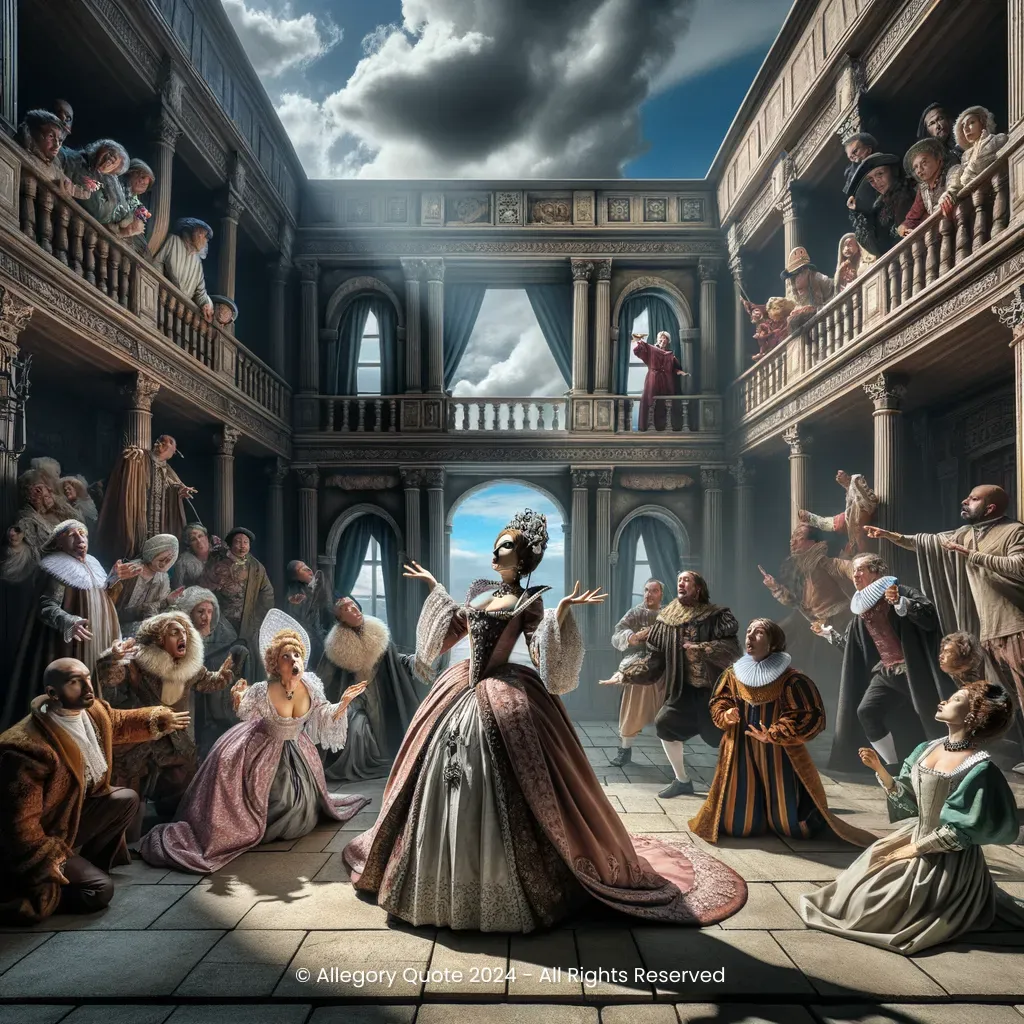The lady doth protest too much, methinks

0
0
0
0
- Meaning
- The phrase "The lady doth protest too much, methinks" suggests that someone who frequently asserts something very emphatically may actually be hiding the opposite. In modern usage, it typically implies that an overzealous denial makes a person's true feelings or actions suspect. Shakespeare uses this line to convey a sense of irony and suspicion.
- Allegory
- The grand medieval theater symbolizes the grandeur and enduring relevance of Shakespeare's works. The regal matron represents "the lady," exaggerated in her defensive posture, hinting at the irony of overprotesting. The small figures in the audience with knowing glances capture the skepticism and suspicion evoked by the phrase. The sky transitioning from clear to stormy represents the shift from perceived innocence to doubt and revelation. The faint shadows embody various human emotions and complexities, emphasizing the intricate nature of deceit and the human condition.
- Applicability
- This phrase can be applied in everyday life whenever you encounter someone who is overly vehement in denying a particular truth or accusation. It serves as a reminder to scrutinize whether their intensity is perhaps a cover for the very thing they're denying.
- Impact
- The impact of this phrase is significant in both literature and popular culture. It has become a common idiom in the English language and is frequently referenced in various contexts to indicate suspicion about the sincerity of someone's denials. Its origin from one of Shakespeare's most celebrated plays adds to its cultural weight.
- Historical Context
- "The lady doth protest too much, methinks" was written in the early 17th century, around 1600-1601. This was a time when Shakespeare was producing many of his greatest works. "Hamlet" delves into themes of treachery, revenge, and the complexity of the human psyche. This line specifically explores the themes of deceit and self-awareness.
- Criticisms
- Some criticisms and controversies revolve around interpretations of the phrase. One argument suggests overemphasis on the notion of falsehood, potentially reducing complex human expressions and emotions to mere deceit, which can be overly simplistic and unfair.
- Variations
- There are no significant variations of this phrase that deviate far from Shakespeare's original wording, although modern interpretations often shorten it to "protest too much." Other cultures might interpret similar behaviors through their own proverbs, which may not directly reference this phrase but convey comparable insights on human behavior.
-

The golden age is before us, not behind us.
-

Parting is such sweet sorrow.
-

Now is the winter of our discontent.
-

Suspicion always haunts the guilty mind.
-

This above all: to thine own self be true.
-

What's in a name? That which we call a rose by any other name would smell as sweet.
-

Et tu, Brute?
-

A horse! a horse! my kingdom for a horse!
-

Good night, good night! Parting is such sweet sorrow, that I shall say good night till it be morrow.
-

If music be the food of love, play on.
-

Out, out brief candle!
-

Some rise by sin, and some by virtue fall.
No Comments